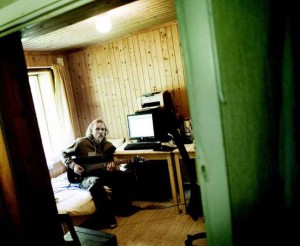On May 21, 2008, a man got into a bus in Seattle, Washington. Upon seeing the blind woman sitting up front, he shouted “The sick must die,” and began pounding her at full force. Before being restrained by bystanders, he made a powerful statement that shocked all who saw it. Here at Sadistic Metal Reviews, we apply his logic to bad metal. 99.9% of everything in this world is shit, metal included. Our job is to beat, rape, slash, punch, pummel, gut, pound and rip into the bad metal, and tip our hats to the good metal. Because if you love metal… you want the best to prevail! Help us kill the sick with this week’s update.

The Bakerton Group – El Rojo
This album really nails what Phish wanted to be all those years ago. Instead of going into the easy Grateful Dead retro jams, this band sums up the 1960s and 1970s by making a funkier version of King Crimson and the Doors, without vocals, so the open jams can expand like a jazz album — and in doing so, they’ve created a work of intense but thoughtful semi-improvised music that is what the brainier rock listeners have been seeking all these years. It’s easier jazz fusion with more structure, or instrumental rock with a soul. Songs start with basic riffs that expand as guitar and then organ takes the lead, finally culminating in a fusion of lead and rhythm guitar not like what Satriani was trying to do, but with more of an influence from the rich and yet offbeat sounds of the late 1960s. It’s not quite prog but it takes many of the best elements of prog, like the lacing of King Crimson style aggro riffing that pulls it back from the happy void, and puts them into a format that lures you in before you realize you’ve left the vocals behind and in doing so, gained a more flexible, varied and nuanced style of music. This is my pick of this review batch.

Israthoum – Monument of Brimstone
Although this band is listed as being from the Netherlands, they are Portguese in origin and sound like a cross between Primigenium and Gehenna. The second-wave black metal sound dominates this record, with cleanly picked chords and notes using updated versions of Darkthrone rhythms under vocals that owe their rhythms and pacing to the slicker versions of At the Gates-inspired death metal that came out in the late 1990s. Musically, Monument of Brimstone competes with the best of its generation, building its songs from basic riffs that through variations harmonize and rise to a peak of intensity. Even though there are newer touches on here like clean vocals and precision, the pacing of each song and their indulgence in a lush atmosphere of melody reveals the heritage of this band among the ideals of the past. In keeping with its style, this music is simple sometimes to the point of being simple-minded, but much of that perception lies in the refusal of the band to dress up simple songs in all sorts of tech wiz trickery that goes nowhere (metalcore, I’m looking at you). This disc may never approach the all-seeing personality of a Beherit, but stands neck-to-neck with the new Profanatica.

Goes Cube – Another Day Has Passed
Imagine crossing Corrosion of Conformity’s “Animosity” with Soundgarden and assorted punk bands, and you get this mixture of rock, metal riffs and newer generation punk aesthetics. Most sounds are founded in the sludgy crossover riffs and bounding, energetic choruses of later COC, but clean-voiced punk and alternative style bittersweet verses really accelerate these songs, giving them sweet pop hooks while backing that up with some surging guitar. This band is more musical than most, having a better sense of harmony and order, but that can’t save them from the lack of direction their basic style endorses. Clean/dirty dualism benefits Linkin Park, but Goes Cube clearly have higher ambitions. My advice is just to make a harmonically-interesting version of later COC and ditch the alt-rock pretensions; that crowd isn’t going to like anything with a metal riff, anyway.

Carpticon – Master Morality
Of all the attributes required to have a killer album, this CD exhibits 95% of them but doesn’t make it on the final 5%. That final bit is the most important: the science of writing melody and putting together melodies to make a song that resembles an attitude toward reality. Everything else is perfect: production, appropriation from Marduk and Antaeus of their strengths in riffing and rhythm, guitar sound, vocals. This album is like a finely made Swiss watch, with perfect appearance and beautiful shiny gears, but it’s always five minutes off. We want to like it but when it turns off we forget it was on, and never somehow manage to reach for it again. Oof.

Asphyx – Death… The Brutal Way
Metal bands coming back from the dead (the old school, swallowed up by the demand of metalcore fans for digestible products) either try to re-state the past, as our Editor kontinual is fond of saying, or they try to pick up where they left off, either trying to “modernize” their sound or develop their old sound. Asphyx go right down the middle. This is a poppier, more bombastic, simpler verse/chorus version of the sound on their self-titled album, and makes nods to some of the song constructions (epic breaks, staggered processionals) from their earlier works. It’s halfway to the Hail of Bullets sound without the metalcore-styled insistence on constant high intensity and chaotic style, and halfway to older Asphyx, but although it is simplified it is nonetheless powerful. If you can imagine The Rack, Asphyx and On the Wings of Infero hybridized with Hail of Bullets or the new Seance, you have the basic idea. Interestingly, at these mid-tempo speeds and simpler arrangements, the punk roots of Asphyx show through, but their punk is also old school, specifically old school hardcore. They break out enough doom metal riffs and slamming death metal riffs to be satisfying, but the ethereal cloudless sky traveling tremolo speed riffs are gone, as are the more involved theatrical constructions that mimicked the topics of song and actually sounded like a march to an altar of doom, or an unhonoured funeral. As a result, I can wholeheartedly recommend this album with the caveat that it’s an A+ take on Asphyx “lite” and as such, a B+ version of older Asphyx that loses some of the great subtlety and grandeur the old school had.

Virus – The Black Flux
It’s really easy to fool metal fans. Just tell them something is unique, and point out what it does that “most metal” doesn’t, and they’ll buy it like labradors eyeing a hot dog. This is goofy, pseudo-gothic rock with semi-technical playing, but shows no distinction in melody or rhythm; in short, it’d be thrown out if it tried to compete in its genre. But you get a bunch of underconfident metalheads looking for mainstream affirmation, and apparently, they buy it, although they will only enjoy it for two weeks of telling other people they “just don’t get it” due (the implication goes) to their inferior mentation. How tiresome. It’s like Opeth but even less distinguished from normal rock music. Fail.

United Nations – United Nations
When nu-metal died, it went straight into alternative rock and picked up that post-Descendents clean-voice punk sound. United Nations start with really gentle punk songs and then put in raging, distorted-vocals choruses, and pick up the pace with adept jazz/metal drumming. The ensuing lack of direction means the band sounds like a punk band that runs into hard times and confusion every thirty seconds, and as a result, the band fails to strengthen either their punk side or their more rock ‘n’ roll side, leaving us the listeners stranded in a middle ground that is quite honestly really simply annoying on an aesthetic level. While musicianship is at a higher level than average, it is also not particularly directed, and so ends up being just very competent guitar playing. I’ll take the punk with spirit and incompetence instead.

Fatal – Retrospective from Hell
Like that kid in the back of your sophomore year English class, Fatal create a true retrospective from Hell by throwing too much into their music all at once. I can appreciate bits of it but I hope I never have to listen to it again (it’s how al-Qaeda will torture me, no doubt). These songs rush at you with vocals and guitar rhythm synchronized, or restate their themes too apparently and too repetitively, hoping the speed will rocket you past the repetition. Lead guitar is surprisingly versatile, sounding like a cross between Thanatopsis and Gorefest. Often times this band sounds like a young Brutal Truth, and indeed one of its more interesting factors is how much it gets away from the heavy metal queso that blights most early death metal attempts, and there’s a clearly interesting convergence of cultural influences from the different metal subgenres here but it’s unclear whether any direction it produces can communicate something eternal, or even something I’d like to hear again. Essentially, this band is a heavy metal band that has disguised itself in death metal camouflage. If you’re one of those fucking idiots who think death metal only got good when it started resembling the rock music it painfully broke away from, you might think this is “progress,” but to the rest of us, it’s a staggering cliche sliding out from a husk of real metal.

Don the Reader – Humanesque
This is off the shelf metalcore. Percussion section is better than average, and there’s a slight Pantera influence that leads to some Southern fried sound bends added to otherwise rigidly square-cut material. The problem this band faces is that it is flamingly obvious. You can pretty much guess not only where every song is going to go, but also, the riffs are just extremely obvious variations on known patterns. If these guys know what’s good for them, they’ll just become a doom metal version of Pantera. We all know metalcore has entered its twilight days, so why not buck the trend and jump the curve?

Creepmime – Chiaroscuro
Every artist has “go to” albums when they run out of ideas, and many of them are obscure works that were full of ideas but for some reason never found an audience. For technical metal, Chiaroscuro must be a go-to for many others, because this band wrote the book on this style far before it became popular. Creepmime on this CD inevitably compare to later Obliveon, Cynic, Voivod, Supuration and Samael: this is technical music using jazzy drumming, indie rock minor-key progressions, death metal lead rhythm riffing and periodically, technical heavy metal flair. It is far better than the second Cynic album because each song here is centered around exploring and expressing an idea, so they remain distinct in our minds. Like Voivod, an infectious rhythm guides us between open chords or sweep-picked fills, with dissonant and inverted chording guiding us through a bouncy but linearly-directed rhythm. Tempi shift not abruptly but sensibly, like undertow tucked into a wave. While each song uses varied basslines, techniques, and multiple riffs, they hold together because Creepmime know how to keep the focus on content. While this early experiment in “modern metal” never caught on, it kept the faith of older metal in the newer style better than anyone save perhaps Demigod, and if re-released today would find its audience finally grew into it.

Mictlantecuhtli – Warriors of the Black Sun
This melodic death metal band writes from the perspective of ancient Amerindian warriors, and while using a modern style, convey that spirit through high-intensity music that makes good use of the template bands like Unanimated, Dissection and Intestine Baalism created to immerse us in a mood of thoughtful, aggressive, and serious engagement with the world. Not without personality, Mictlatecuhtli carefully weave the punchy motivational riffing of later Sepultura into this format, giving it a compelling forward direction. While there’s nothing here that will surprise a metal fan, this release stays closer to the heart of the motivation behind this type of metal music than any recent release. At the very least, there’s no excuse for your Dark Tranquility, In Flames, and Amon Amarth CDs when the real deal comes to you from Mictlantecuhtli.

Solstafir – Köld
Remember when it was really hip and trendy to use the word “shambolic” a year or so ago? Metal has its trends to as people look for some direction that’s proven to “work,” or get them on the bestseller list. Solstafir stumble in with last year’s trend, which is to mix a whole lot of shoegaze into your metal. However, the band make one salient and brilliant decision, which is to keep the pace fast and thus not aggressive as much as energetic and seemingly important. Yet chord progressions and general sensibility tell another tale, as do the production and “why, God, why” vocals. The problem is that metal is so distinctive and clear in its motivations, like a headstrong style, that mixing it with just about anything results in that anything “with a few metal riffs.” That’s about what it sounds like here. Unfortunately, they do so without any real grace, using well-known chord progressions and rhythmic changes in atmospheric songs that hold together mainly because of the rote pounding of that atmosphere. This will not satisfy metal fans, but people accustomed to shoegaze might find it an interesting deviation of aesthetic.

Divine Heresy – Bringer of Plagues
Modern death metal is a lot like the modern time: throw everything into a bowl, pour dressing over it, and call the resulting salad “distinct” even though it has made itself as generic as possible. With too many different tastes, you end up with a background hum of all the same intensity. This CD is no exception, with metalcore composition and generally melodic technical death metal riffing, but vocal chanting like a combination between Pantera and Biohazard; then, each song must break into clean vocals that are a combination between the cheesiest moments of (new) Metallica and something like Coldplay. It tries to be emotional, but since there’s no direction and every different ingredient in its salad is turned up to 11, you end up with a wash of different stuff that never forms into a shape or takes a stand. You could compare it to a sitcom: the story (songwriting) is the background, but you need a different scene or distraction every two minutes so the audience can keep laughing even though they’re only watching with one eye. I think this CD like so many modern metal ones is designed to be heard with half an ear, with the TV and GAIM going in the background, maybe while eating something really sticky. Flee.

Negura Bunget – Maiastru Sfetnic
When people talk about how black metal has been “band of the month” since 1994, this album comes to mind because it was massively feted, and then fell off the radar. In it we can see why most second-wave black metal failed, which is that these bands try to mix so many different styles into one they end up with an ambiguous voice, in addition to by emulating the past having nothing to do but recombine older elements, which further dilutes any idea for a song they might have had. Songs should be like poetry; based on a feeling, or about an experience, they are there to convey the change in mood that made that experience memorable. This album conveys the experience of flipping through a catalog of metal CDs, and hearing samples of random parts of each, which are then tied together into a dramatic black metal style that has so little contrast it’s like going through Disney’s “The Haunted Mansion” at 60 mph, repeatedly. Dangerous because it’s so close to good, at least if you listen to a minute at a time, this album goes nowhere ultimately and so leaves us feeling like we’ve just eaten 3,000 calories of junk food — like a steak, but less satisfying. There’s a good reason this was popular: they can play their instruments, and the production is good if primitive. But there’s an equally good reason we so quickly forgot it.

Ajattara – Noitumaa
This all-acoustic album resembles the attempts of other black metal bands to rediscover a folk-ish sound, like Wardruna and Lord Wind, by leaving behind the rock instrumentation and focusing on writing melodies like those in the indigenous cultural songs of their youths. Interestingly, their refusal to ditch the black metal vocals makes them stand out further as harsh and unyielding, and slices a vicious element deep into this music, which is about as far from the blues-folk of radio indie that you can get. These are simple songs with savage rhythms and complex emotions. While song structures are cyclic and so wear down the listener after some time, and many of the riffs here sound like they were originally composed for distorted guitar, the acoustic guitar offers dynamics unavailable to black metal and this enables this band to immerse themselves in a musical subtlety that gives these songs depth. By far better than this band’s black metal releases, this album of occult, pagan, primitive campfire songs is worth hearing.

Weapon – Drakonian Paradigm
The first track, “Weapon,” uses an introductory riff/solo pair that resembles the first track on Unanimated’s In the Forest of the Dreaming Dead album, a minor-key bluesy sound; the rest of the album does not improve on this: Weapon are trying to merge heavy metal and war metal and as a result have made a kind of pop music that might be interesting if it’s your first metal album. This album is musically well-executed, but that’s only a means of tying together its parts, not make them express anything. And express nothing they do, except that sense of “you’re listening to some kind of metal” that comes with simple beats, solos so fast they sound like eunuchs on speed mumbling, and raspy vocals. Every single song here uses well-known patterns with no new interpretation. It panders to the audience by delivering what they expect, in sloppy underground fashion aping a version of the same mainstream heavy metal most of us hide from if given a chance. The problem is that it’s boring. It’s basically 1970s heavy metal, kind of sloppy like Venom, with bouncy rhythms. If I wanted to listen to pop music disguised as the avantgarde, I’d just hook up with some DEERHOOF and tight jeans. This is everything I hate about heavy metal: an insular culture that rewards repetitive pointless music so they can have an identity, clustered in products like jean jackets and CDs, that has nothing to do with experiencing life — but rather, hiding from it.

Monstrosity – Spiritual Apocalypse
Take the faster parts from earlier Cannibal Corpse, put bluesy solos on half of them, and have them rush into foreboding riffs like Immolation makes, complete with the pinch harmonics and harmonizing that gives that band its dark sound. Toss in a few bouncy heavy metal riffs. The real problem with this CD is that songs don’t fit into songs. They are cyclic riff pairs joined by the aforementioned dark rushing riffs. The intensity of percussion and speed confuses the direction of songs as well by compressing their dynamics and limiting their vocabulary of tempos, so riffs sound similar by the sheer basis of rushing by so quickly. Some of the riff writing and melodic work on this is fantastic, reminiscent of early Brutality, but the “modern death metal” tendency to shift randomly between riffs and styles creates a headache in the making, which is why old schoolers are probably going to avoid this thing. The album is catchy and hookish but the sensation is dulled as it pounds its way into your head. The individual riffs, rhythms and transitions are of quality, but they are assembled without subtlety, making this hard to listen to for long.

Satyricon – Now, Diabolical
This CD reminds me of Coroner’s “Grin” meeting later Samael. The beats are groovy, with a strong disco influence that extends to song structure, and riffs are pleasantly arranged around harmonic structures of a basic nature, making it really easy to listen to, but hard to really immerse yourself in, because it’s basically no different than alternative metal like later Prong or Filter. Unlike early Satyricon, which tried long melodies it couldn’t quite pull off, this album rushes headfirst into rock and, like early Danzig albums, delivers a pleasant listening experience, even if not one memorable enough to reach for time after time.

Massacre – The Second Coming
Huge for a moment in the 1990s because they inherited Death’s rhythm section and lead rhythm guitarist, Massacre somehow dropped off the radar with The Promise, a CD so bad it defies description. Now they’ve released this tribute to their early years with a demo of an album from before their post-death lineup. It’s in a different style that can be best described as a fusion of technical speed metal (Dark Angel) and old school death metal like Master or Nunslaughter, which results in a periodically very musical work that nonetheless plods ahead with heavy repetition and little harmony. The sense of this music being unformed, like most death metal from the 1980s, is palpable; there are bits of heavy metal, speed metal, punk and nascent death metal in a kind of salad that makes no sense, like a journey through radically different terrain. Interestingly, it sounds a lot like the Mantas demos from the early 1980s, which also had Kam Lee on them. Which way did the influence flow? We will probably never know. It is also worth mentioning that after they recorded this, they stored it underwater near a radio transmitter, so the sound quality is slightly worse than the average demo. Songwriting shows promise but is not mature. In contrast, the live recording of “From Beyond” seems otherwordly good. If I could send a wish into the universe, it’s that Kam Lee re-records/re-constructs this album with musicians more versed in early 1990s death metal.

Vorum – Grim Death Awaits
Mix old Seance with the Funeral Mist style of forward-grinding death metal, and you get Vorum: almost a tribute to Grave-cum-Florida-DM, but rapidly degenerating into heavy metal cliches. The problem with bands of this level is that they don’t understand that turning everything up to 11 sounds really cool but gets completely uniform after awhile, as does the inability to make a melody longer than three notes, because it condemns them to repeating known riff patterns at top speed. All of this is thoroughly competent, mind you, but it’s what Michael Crichton called “thin intelligence”: a large amount of ability, but thinking limited to that ability, and so no ability to get the bigger picture and make art of it. Spare me.

Mgla – Presence
Black metal “standards” since 1994 have plummeted like a rock, which is why year to year, people mention different favorite bands. It’s as if memory has been erased in information overload. Mgla have studied the canon of black metal carefully, and then, have made the same boring rock music you can find in a million other forms — but it’s dressed up as black metal. For starters, they have no conception of how black metal melodies are written, but they know how to use different chord shapes for that “black metal effect”! Next, there’s zero ability to comprehend black metal dynamics. This CD is like a cage of monkeys constantly shouting for attention. There is no lead-up, no building, no suspense and no contrast — just constant shrieking and Burzum technique wrapped around melodies and happy offbeat riffs that would be apt for a Coldplay album. Burn this farce.

Kroda – Towards the Firmaments Verge of Life
These guys produce their vocals like Summoning, and their guitar distortion like the band down the street. Who convinced them this cheap, hollow digital sound would go anywhere? Their songwriting is great except for two factors: (1) a dependency on verse chorus and every third iteration, an interruption with an interlude or non-harmonic bridge; (2) the melodies they write are both happy and simple, like pop with ancient overtones. It’s not bad but it’s somewhat irritating and not a resonant keeper, although it’s fair to mention this band is more interesting than 98% of what comes over my desk. I hope they fix the production, write in varying modes, and fit song structure to the form of its content, and then they’ll be rocking.

Abaroth – The Mountain Gate
So many people grasp so much of black metal but not the ability to use it expressively. This excessively rhythmically chant-aligned album shows a good working knowledge of the black metal aesthetic — and songs that go nowhere. They start, enter us into a cycle of two riffs, interrupt the cycle and return and then end, seemingly abruptly, without much having changed. They are like summer electrical storms from a distance in that there’s a bunch of flickering and frenetic activity, and then everything is just as it was. It’s hard to summon the courage to down releases like this, and there are many, because there’s nothing “wrong” with them — but there’s also nothing so right you’d want to pull it off the shelf and listen to it, and the core of that “tl;dr” impulse is that they don’t express anything unique. They’re variations on the known, and even if they’re more competent there’s nothing to make you want to return to them.

Militia – The Sybling
Someone mentioned this as a classic of great rarity. It may be rare — but it should be rarer. Did you want 1980s style power metal, with disconnected vocals floating above some standard riffs spewed from downtuned guitars? Yeah, it’s about like that. The result is dischordant and not particularly memorable, although I’m certain it’s rare. Hopefully they’ll box up the remaining copies and exile them to Skull Island so no one has to hear this. It’s NWOBHM with speed metal riffs and none of the grace.

Isis – Wavering Radiant
The hardest part about modern society is keeping a straight face. Someone will hand you something misbegotten, tell you it’s good and that many people really dig it. Your job is then to keep from laughing or crying until you’re out of the room. Isis sounds to me like Jawbreaker’s Bivouac — lots of different stuff going on, but none of it develops on the other stuff; it’s all just a sampler plate, and it relishes the “differentness” of its parts as proof that it has great breadth and thus universal wisdom — as done by an indie rock band or shoegaze allstar. I guess that’s what floors me most: how little “different” is going on here, and how much of well-camouflaged “same” is present. There are periodic indie metal riffs, meaning they’re not twisty phrases of interest like death metal but a lot of strumming with sudden breaks. But it’s different, you see, because it’s all mixed together, and even though everything else is made of mixed-together stuff, this mix is different. The clean singing reminds me of Christian rock bands. The melodies are jazzy pop but stay localized in different parts of each song, making the whole thing an incoherent salad of bits that try so hard to be like a style that they end up being stylish but having no distinct voice of their own. This album is truly the triumph in metal of insincere people — call them poseurs, scenesters, hipsters or consumers if you’d like — who can only see surface appearance because they fear what lurks beneath, so they specialize in making the same old stuff but accessorizing it as something cosmic and groundbreaking. Apparently this is popular and I should not laugh at it.

Mayhem – Ordo ad Chao
For some reason this reminds me of Portal or Molested: a lush texture of harmony, in which variances drop out some sounds and augment others, like a pure harmonic tuner of mood. This de-emphasizes rhythm, although there’s plenty of rhythm work present, but usually to work the song up to that state of harmonic wall of noise. I think it’s a response to Burzum’s rhythmic sweep-picking technique. Either way, it is a really interesting sound that approximates some of the odd chord shapes and thus non-standard harmony to semi-standard progressions that defined Thorns; it gives this music a depth and mystery that no previous Mayhem album has had. In fact, this is the best thing they’ve done since De Mysteriis Dom Sathanas, although artistically it’s probably only about a quarter as powerful as that album. Its Achilles heel is that repetition of technique and similar rhythms makes the songs indistinguishable from each other and ruins the dramatic effect of contrast. Like many black metal releases post-1994, I don’t mind this but feel no reason to take it off the shelf and listen to it.

Impiety – Terroreign
The trends come and go. One year it’s Velvet Caccoon, the next Cemetary, and then everyone wants to get back to their roots so the trend is the anti-trend. Impiety tuned in to the anti-trend by going back to Grave, Repulsion and other really simple versions of the death metal paradigm. They do OK at this because they are able to write really compelling rhythms. Unfortunately, no melody or sense of structure emerges from that, so these are very box-cut songs with rather predictable progressions. The band themselves seem to know this, and kill as much time as possible with guitar squeals, noise, and stop/start rhythmic passages designed to make us think something exciting is going to happen. It doesn’t.
There you have it — another set of reviews that accurately reflects like: 90% of it sucks, 9% is OK, and 1% is what you really live for. It’s the same with metal. Unlike other review sites, we can’t be bought and won’t write a lie in a review, so you get the pure skinny on what sucks and the occasional floater that rises above the dense, shadowy turds that lurk in the murky shallow pool of metal. If you go out there and buy only the best, the weak will starve and metal will be stronger, which is why we write sadistic metal reviews.
No Comments Metal was born into the industrial settings of England by taking rock music and injecting a strong dose of fatalism into it, influenced no doubt by the bleak and dehumanizing surroundings that the first metal heroes experienced. With time, the genre made gigantic leaps, evolving into a nihilistic, naturalistic and romantic artform which splitted from the mainstream forms (the “craft”) from which it initially developed.
Metal was born into the industrial settings of England by taking rock music and injecting a strong dose of fatalism into it, influenced no doubt by the bleak and dehumanizing surroundings that the first metal heroes experienced. With time, the genre made gigantic leaps, evolving into a nihilistic, naturalistic and romantic artform which splitted from the mainstream forms (the “craft”) from which it initially developed.




























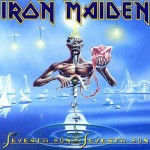
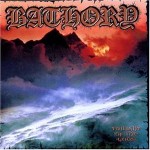
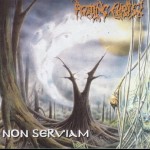
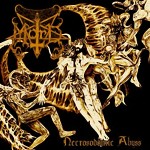 The new Osmose recruits Mord seem to have been actually born in Poland, then relocated to near Kristiansand, which is remembered as the location of a violent death metal sect in support of Varg Vikernes back in 1991 and the origin of Tchort (Blood Red Throne, Emperor, Green Carnation). Not quite living up to the bloody and progressive traditions of the area, Mord specializes in a cold, modern, thrashed-out black metal sound that could scientifically have been developed in a norsecore factory to create an endless amount of productive clones. Maybe because they are originally from Poland, they do seem to possess a better grasp of what makes Nordic black metal good than most Scandinavians around exhibit. They keep the album vile and to the point, imitating the blasphemous rhythm guitar of, besides Euronymous, Ivar Bjørnson during the phase of Enslaved when they dropped most of their classical influence and switched to riff rock. Later Ancient springs to mind in tracks such as “Opus II” which is essentially is a meeting of pop and black metal in a graveyard infested with drunked teenagers who wear makeup and like to flash stupid expressions in photos. It may sound bad but in fact, as guitar rock or something, it excels. It is simply lacking in the Romantic nature worship, warrior ideology and mysticism of Burzum, Ildjarn and the other greats. So while musically this has potential for an above average Norwegian black metal album (even though these ideas are 15 years late) it ends up as one more relic that brings black metal closer to mainstream acceptance and youth culture phenomena today, and no-one will remember it in ten years.
The new Osmose recruits Mord seem to have been actually born in Poland, then relocated to near Kristiansand, which is remembered as the location of a violent death metal sect in support of Varg Vikernes back in 1991 and the origin of Tchort (Blood Red Throne, Emperor, Green Carnation). Not quite living up to the bloody and progressive traditions of the area, Mord specializes in a cold, modern, thrashed-out black metal sound that could scientifically have been developed in a norsecore factory to create an endless amount of productive clones. Maybe because they are originally from Poland, they do seem to possess a better grasp of what makes Nordic black metal good than most Scandinavians around exhibit. They keep the album vile and to the point, imitating the blasphemous rhythm guitar of, besides Euronymous, Ivar Bjørnson during the phase of Enslaved when they dropped most of their classical influence and switched to riff rock. Later Ancient springs to mind in tracks such as “Opus II” which is essentially is a meeting of pop and black metal in a graveyard infested with drunked teenagers who wear makeup and like to flash stupid expressions in photos. It may sound bad but in fact, as guitar rock or something, it excels. It is simply lacking in the Romantic nature worship, warrior ideology and mysticism of Burzum, Ildjarn and the other greats. So while musically this has potential for an above average Norwegian black metal album (even though these ideas are 15 years late) it ends up as one more relic that brings black metal closer to mainstream acceptance and youth culture phenomena today, and no-one will remember it in ten years.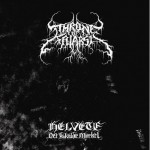 While the gloomy shroud of 21st century black metal clichés weighs like lead upon Throne of Katarsis, a sense of ambition and greatness, the carefully followed tread of frozen melody including an airy vastness copied from In the Nightside Eclipse or early Taake and some elegant and progressive forms makes this rise above the level of total weakness. Like Isvind and Tsjuder, Throne of Katarsis explore the melodic territory in between Darkthrone and Emperor in an effort to replicate the impression of transcendent evil boiling in the depths. Fast percussion underlies the sonic depression of dubiously plodding, soaring but monotone and unenergetic low production (Grieghallen copy) guitars repeating spherical themes (rotating the minor chords “De Mysteriis” style during the slow parts over and over again to give the melancholic feeling) over to vastness. The best of the musical ideas are hidden by the desire to create a standard black metal album, as they probably succumbed to creating an album too quickly and thinking that it’s enough to put out cold and intensity-devouring two-penny riffs that have been overused for 20 years – bulk Norwegian black metal in good and bad.
While the gloomy shroud of 21st century black metal clichés weighs like lead upon Throne of Katarsis, a sense of ambition and greatness, the carefully followed tread of frozen melody including an airy vastness copied from In the Nightside Eclipse or early Taake and some elegant and progressive forms makes this rise above the level of total weakness. Like Isvind and Tsjuder, Throne of Katarsis explore the melodic territory in between Darkthrone and Emperor in an effort to replicate the impression of transcendent evil boiling in the depths. Fast percussion underlies the sonic depression of dubiously plodding, soaring but monotone and unenergetic low production (Grieghallen copy) guitars repeating spherical themes (rotating the minor chords “De Mysteriis” style during the slow parts over and over again to give the melancholic feeling) over to vastness. The best of the musical ideas are hidden by the desire to create a standard black metal album, as they probably succumbed to creating an album too quickly and thinking that it’s enough to put out cold and intensity-devouring two-penny riffs that have been overused for 20 years – bulk Norwegian black metal in good and bad.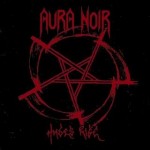 I do remember the Apollyon/Aggressor duo Aura Noir as a high-energy, motor powered and tradition respecting black metal cult from the days of the bewitching “Dreams Like Deserts” MCD, never afraid to rock out nor experiment with unusual guitar and drum techniques – even cross-quoting with Ved Buens Ende material. Something really devastating has happened and I don’t know if it has to do with Aggressor’s falling down from a balcony or something, but they sound totally drunk, tired and old on this album. I mean, if you think that Darkthrone nowadays sounds like a lazy beer-swilling band from the pub, try this one! I can hear they are trying to play like Sodom, but I can’t hear any Germanic “raaaaaah!” mania. I can hear Autopsy, but I can’t hear the stinking amputated corpses rising all around to wreak their vengeance upon the societies of the living. I can hear hardcore, but I can’t hear the decisive violent power of wrath against conformity. So, what is there left? It sounds a bit Southern Lord-y – you know, ironic old metal fan hipster who likes to get stoned out of his mind and listen to feel-good old-times metal. By the way, the drum production sounds like MIDI – utter failure. If you want real speed/black metal power, go for the originals, this one is a weak joke.
I do remember the Apollyon/Aggressor duo Aura Noir as a high-energy, motor powered and tradition respecting black metal cult from the days of the bewitching “Dreams Like Deserts” MCD, never afraid to rock out nor experiment with unusual guitar and drum techniques – even cross-quoting with Ved Buens Ende material. Something really devastating has happened and I don’t know if it has to do with Aggressor’s falling down from a balcony or something, but they sound totally drunk, tired and old on this album. I mean, if you think that Darkthrone nowadays sounds like a lazy beer-swilling band from the pub, try this one! I can hear they are trying to play like Sodom, but I can’t hear any Germanic “raaaaaah!” mania. I can hear Autopsy, but I can’t hear the stinking amputated corpses rising all around to wreak their vengeance upon the societies of the living. I can hear hardcore, but I can’t hear the decisive violent power of wrath against conformity. So, what is there left? It sounds a bit Southern Lord-y – you know, ironic old metal fan hipster who likes to get stoned out of his mind and listen to feel-good old-times metal. By the way, the drum production sounds like MIDI – utter failure. If you want real speed/black metal power, go for the originals, this one is a weak joke. It would be quite interesting to see if someone, somewhere in Norway, has during the year released black metal or death metal which does not a) try to duplicate the old Grieghallen soundscape with in the most generic no-sense-of-style manner, b) fill their album with a load of budget riffs called depressive black metal by the kids (which is actually C, D, E minor again… and again…). Anyway, while Celestial Bloodshed has ripped off these ideas from better bands, they are 50% better in their songcraft than Watain, Funeral Mist and other generic black metal of the era. Also, they have been able to create inner beauty towards the realization of the music in melodic intensity. Additionally, the fullness of the soundscape and the implications of the structure make this release more grim, oppressive and grinding than the mainsteam manipulations of Norwegian metal which can not be but a good thing. After a beautiful intro which sounds somewhat like one of the demos from Equimanthorn (Absu members’ ritual project) the album pounds into a lexicon of guitar techniques borrowed from a range of musicians from Mayhem to Enslaved, with a dynamic range from slow romantic soulseeking to blasphemous speeds, sometimes bridged with jarring changes, while death metal influenced vicious, likeable and personal (down to some insistent mannerisms) vocals pace like hammer upon an anvil the grim predictions of mortal future and the drummer operates battery like Faust and Hellhammer used to in the early 90′s. While all of this is not fully developed yet into pure communication, it speaks with instant, amazed, satanic impressions of life facing the darkness of Infinity – Celestial Bloodshed has replicated the old school with care, honesty and vicious intent.
It would be quite interesting to see if someone, somewhere in Norway, has during the year released black metal or death metal which does not a) try to duplicate the old Grieghallen soundscape with in the most generic no-sense-of-style manner, b) fill their album with a load of budget riffs called depressive black metal by the kids (which is actually C, D, E minor again… and again…). Anyway, while Celestial Bloodshed has ripped off these ideas from better bands, they are 50% better in their songcraft than Watain, Funeral Mist and other generic black metal of the era. Also, they have been able to create inner beauty towards the realization of the music in melodic intensity. Additionally, the fullness of the soundscape and the implications of the structure make this release more grim, oppressive and grinding than the mainsteam manipulations of Norwegian metal which can not be but a good thing. After a beautiful intro which sounds somewhat like one of the demos from Equimanthorn (Absu members’ ritual project) the album pounds into a lexicon of guitar techniques borrowed from a range of musicians from Mayhem to Enslaved, with a dynamic range from slow romantic soulseeking to blasphemous speeds, sometimes bridged with jarring changes, while death metal influenced vicious, likeable and personal (down to some insistent mannerisms) vocals pace like hammer upon an anvil the grim predictions of mortal future and the drummer operates battery like Faust and Hellhammer used to in the early 90′s. While all of this is not fully developed yet into pure communication, it speaks with instant, amazed, satanic impressions of life facing the darkness of Infinity – Celestial Bloodshed has replicated the old school with care, honesty and vicious intent.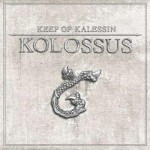 Keep of Kalessin arouse my interest during their demo days, as 1997′s “Skygger av Sorg” repeated the style of old Satyricon in a series of simple, emotional song fragments that revealed a sad beauty lying underneath the grim soundscape. I had heard some less interesting newer material but it is truly shocking what they have submerged into now – an arrogant, over-produced tribute to the honor of Greek warriors through quasi-talented commercial death metal. Synth washes and expressive vocals (in the vein of Nergal when he’s really pissed off in the later Behemoth albums) fill this piece of plastic because they want to sound big and they want to play on a stadium. I am convinced that someone with their musicianship should be able to create a listenable and consistent album, but these super fast blastbeats and commercial heavy metal oriented song dynamics from quiet to loud make this just a faux extreme version of something like Spearhead or Deströyer 666, made worse by the angry shouter vocalist. The people interested only in dry technique and production standards will love this for being an emphatic and empty opera of sharp drumwork and the constantly shifting death metal type fast guitars and entertainment value. They are also happy that it lacks the primal natural force of old Norwegian metal, because it might be distrubing. The sense of space created should be one of a studio or a big venue, instead of a woodland crypt, right? This amount of polishing emphasizes the superficiality of the entire composure, down to metalcore action computer game synchronized by MIDI in Kolossus, where accurate but inconsequential fast drum beats follow cheap-ass tremolo melodies from the pits of norsecore Hell and the vocalist sounds angry at people at the nearby mall and emo pop chorus in “Ascendant” which doesn’t even fit the music underneath. Likewise the arabic solos in the middle part of “Kolossus” don’t seem to have anything to do with the metal riffs, nor do the “300″ soundtrack reminiscent bits with synths and tablas. Whoever has produced this must be a commercial minded jerk.
Keep of Kalessin arouse my interest during their demo days, as 1997′s “Skygger av Sorg” repeated the style of old Satyricon in a series of simple, emotional song fragments that revealed a sad beauty lying underneath the grim soundscape. I had heard some less interesting newer material but it is truly shocking what they have submerged into now – an arrogant, over-produced tribute to the honor of Greek warriors through quasi-talented commercial death metal. Synth washes and expressive vocals (in the vein of Nergal when he’s really pissed off in the later Behemoth albums) fill this piece of plastic because they want to sound big and they want to play on a stadium. I am convinced that someone with their musicianship should be able to create a listenable and consistent album, but these super fast blastbeats and commercial heavy metal oriented song dynamics from quiet to loud make this just a faux extreme version of something like Spearhead or Deströyer 666, made worse by the angry shouter vocalist. The people interested only in dry technique and production standards will love this for being an emphatic and empty opera of sharp drumwork and the constantly shifting death metal type fast guitars and entertainment value. They are also happy that it lacks the primal natural force of old Norwegian metal, because it might be distrubing. The sense of space created should be one of a studio or a big venue, instead of a woodland crypt, right? This amount of polishing emphasizes the superficiality of the entire composure, down to metalcore action computer game synchronized by MIDI in Kolossus, where accurate but inconsequential fast drum beats follow cheap-ass tremolo melodies from the pits of norsecore Hell and the vocalist sounds angry at people at the nearby mall and emo pop chorus in “Ascendant” which doesn’t even fit the music underneath. Likewise the arabic solos in the middle part of “Kolossus” don’t seem to have anything to do with the metal riffs, nor do the “300″ soundtrack reminiscent bits with synths and tablas. Whoever has produced this must be a commercial minded jerk.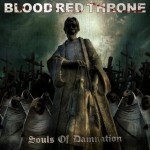 Tchort from Kristiansand was a newcomer to the death metal scene with his band Green Carnation right when the genre went out of fashion because of Euronymous’ hatefulness towards it and while that name was resurrected for Tchort’s progressive metal project he formed the neo-death metal group Blood Red Throne at the end of the millennium. While not having heard the early Green Carnation material, it’s easy to hear from this that some trace of early influence from excellent bands like Grave and Cadaver does exist, but none of their ability to turn basic riff structures into progressive and morbid magic. This type of song construction mostly resembles Cannibal Corpse and Deicide during the latter’s worst days of In Torment In Hell, filling songs with groovy mosh parts, faux-brutal growls and the drummer and bass player (from Deeds of Flesh) insisting wimpily on always playing to the beat of the riff. If this is the king on Norway’s death metal throne since Cadaver disbanded, it is quite sad actually. Most good (death) metal is memorable from its melodies, however convoluted and vicious they may be, but Souls of Damnation is mostly simple rhythmic phrases like guitar exercise patterns for introducing mechanical creation technique for sub-Florida death metal. Like all boring death metal, it severely underestimates its audience. I mean, many listeners do like death metal that sounds like basic no-frills brutal grind, but this worthless chugging goes too far. It seems like the whole album lacks even one interesting melody part or arrangement.
Tchort from Kristiansand was a newcomer to the death metal scene with his band Green Carnation right when the genre went out of fashion because of Euronymous’ hatefulness towards it and while that name was resurrected for Tchort’s progressive metal project he formed the neo-death metal group Blood Red Throne at the end of the millennium. While not having heard the early Green Carnation material, it’s easy to hear from this that some trace of early influence from excellent bands like Grave and Cadaver does exist, but none of their ability to turn basic riff structures into progressive and morbid magic. This type of song construction mostly resembles Cannibal Corpse and Deicide during the latter’s worst days of In Torment In Hell, filling songs with groovy mosh parts, faux-brutal growls and the drummer and bass player (from Deeds of Flesh) insisting wimpily on always playing to the beat of the riff. If this is the king on Norway’s death metal throne since Cadaver disbanded, it is quite sad actually. Most good (death) metal is memorable from its melodies, however convoluted and vicious they may be, but Souls of Damnation is mostly simple rhythmic phrases like guitar exercise patterns for introducing mechanical creation technique for sub-Florida death metal. Like all boring death metal, it severely underestimates its audience. I mean, many listeners do like death metal that sounds like basic no-frills brutal grind, but this worthless chugging goes too far. It seems like the whole album lacks even one interesting melody part or arrangement.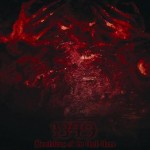 One of the newer Oslo bands mostly known from relentless and uncompromising fast black metal, 1349 surprise with their latest effort in refusing to conform to the rules of the flock. This time conjuring echoes of Samael’s Ceremony of Opposites and later Mayhem, 1349 composes suffocated, devilish and industrial tinged black metal sounds which despite being somewhat predictable, retain the doomy beauty of an industry of inferno. The loneliness of space as described in Moorcock’s trippy novel “The Black Corridor” and the classic fantasy movie “Alien” fill this Gigerian landscape of planets, threats and biomechanical blasphemies. Bodies twitch into contorted positions in a sea of light. The psychedelic feel is enhanced by a cover of Pink Floyd’s “Set the Controls for the Heart of Sun” featuring Tom G. Warrior. Several tracks use minutes to unfold submerged ambient and experimental soundscapes, while there is some Red Harvest type digital manipulation featured in many of the metal songs too. The arrangement is dramatic and regal, with Frost’s drumming skills put to good use. Multiple vocal styles herald the theatrical nature. Some interesting lead guitars add desperate wails to the background. Some parts are in their wicked minimalism close to what one could also expect to, say, Beherit to compose if he were in a more commercial high budget recording project, making this one of the more worthwhile efforts from Norway last year in producing new vistas of black metal.
One of the newer Oslo bands mostly known from relentless and uncompromising fast black metal, 1349 surprise with their latest effort in refusing to conform to the rules of the flock. This time conjuring echoes of Samael’s Ceremony of Opposites and later Mayhem, 1349 composes suffocated, devilish and industrial tinged black metal sounds which despite being somewhat predictable, retain the doomy beauty of an industry of inferno. The loneliness of space as described in Moorcock’s trippy novel “The Black Corridor” and the classic fantasy movie “Alien” fill this Gigerian landscape of planets, threats and biomechanical blasphemies. Bodies twitch into contorted positions in a sea of light. The psychedelic feel is enhanced by a cover of Pink Floyd’s “Set the Controls for the Heart of Sun” featuring Tom G. Warrior. Several tracks use minutes to unfold submerged ambient and experimental soundscapes, while there is some Red Harvest type digital manipulation featured in many of the metal songs too. The arrangement is dramatic and regal, with Frost’s drumming skills put to good use. Multiple vocal styles herald the theatrical nature. Some interesting lead guitars add desperate wails to the background. Some parts are in their wicked minimalism close to what one could also expect to, say, Beherit to compose if he were in a more commercial high budget recording project, making this one of the more worthwhile efforts from Norway last year in producing new vistas of black metal.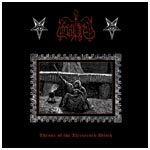 This little EP from Mare, one of the infamous Trondheim cults tends to sound a bit like Live in Leipzig era Mayhem recording in a sewer infested with rats and worms and the decrepit and rotten soundscape makes this one an aesthetically more attractive listen than most of the studio produced turds. Intuitively they grasp the idea of structuring long songs in the old Emperor vein so that while the bits and pieces are redundant, it is a journey through minimalist music themes into the realization and acceptance of the power of darkness. Slow, crawling, anti-logical repetition of simple melody (where the keyboards add a tasteful of old Enslaved) make it a bit of an un-musical experience – the composition seems to be mostly oriented to the fans of droning soundscape whereas the planning and calculation in the overstated reverb, vocal sound (while Kvitrim is good at pacing) and lack of invention in the riffs suggest seem to be aimed for the black metal consumer. But it is deconstructive, degenerate and deceitful music – for pure ideas, about as good as the best of the bunch reviewed here. An ambience and sense of space is reached, the Faustian concept of man as a warrior who travels and explores the universe, only to relinquish his individuality to the higher natural order – in death and rebirth.
This little EP from Mare, one of the infamous Trondheim cults tends to sound a bit like Live in Leipzig era Mayhem recording in a sewer infested with rats and worms and the decrepit and rotten soundscape makes this one an aesthetically more attractive listen than most of the studio produced turds. Intuitively they grasp the idea of structuring long songs in the old Emperor vein so that while the bits and pieces are redundant, it is a journey through minimalist music themes into the realization and acceptance of the power of darkness. Slow, crawling, anti-logical repetition of simple melody (where the keyboards add a tasteful of old Enslaved) make it a bit of an un-musical experience – the composition seems to be mostly oriented to the fans of droning soundscape whereas the planning and calculation in the overstated reverb, vocal sound (while Kvitrim is good at pacing) and lack of invention in the riffs suggest seem to be aimed for the black metal consumer. But it is deconstructive, degenerate and deceitful music – for pure ideas, about as good as the best of the bunch reviewed here. An ambience and sense of space is reached, the Faustian concept of man as a warrior who travels and explores the universe, only to relinquish his individuality to the higher natural order – in death and rebirth.